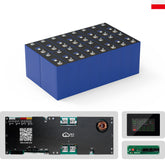Vida útil de una batería de iones de litio de 48 V en carros de golf
Al invertir en un carrito de golf eléctrico, uno de los factores más importantes a considerar es la vida útil de una batería de iones de litio de 48 V. Estas baterías son conocidas por su eficiencia, durabilidad y menor necesidad de mantenimiento en comparación con las opciones tradicionales de plomo-ácido. Pero ¿cuánto duran realmente y qué influye en su vida útil? Esta guía explora todo lo que necesita saber para tomar una decisión informada sobre el sistema de alimentación de su carrito de golf.
- Comprensión de los conceptos básicos de una batería de iones de litio de 48 V
- Vida útil típica de una batería de iones de litio de 48 V en carros de golf
- Factores que afectan la vida útil de una batería de iones de litio de 48 V
- Ventajas de una batería de iones de litio de 48 V frente a las opciones de plomo-ácido
- Cómo maximizar la vida útil de su batería de iones de litio de 48 V
- Análisis de costos y ROI de una batería de iones de litio de 48 V
- Tendencias futuras en la tecnología de baterías de iones de litio de 48 V
- Reflexiones finales sobre la vida útil de una batería de iones de litio de 48 V en carros de golf
Comprensión de los conceptos básicos de una batería de iones de litio de 48 V
¿Qué es una batería de iones de litio de 48 V?
Una batería de iones de litio de 48 V es un paquete de baterías recargable que suministra 48 voltios de energía eléctrica. Generalmente está compuesta por celdas de fosfato de hierro y litio (LiFePO₄), conocidas por su estabilidad térmica, seguridad y larga vida útil. Estas baterías se utilizan ampliamente en carritos de golf debido a su alta densidad energética y rendimiento constante.
Por qué es importante el voltaje
El voltaje determina la presión eléctrica que puede suministrar la batería. Una batería de 48 V se considera ideal para carritos de golf, ya que proporciona suficiente potencia para un funcionamiento eficiente sin sobrecargar el motor ni los componentes eléctricos. Un voltaje más alto generalmente se traduce en mayor velocidad, par motor y capacidad para subir pendientes.
Vida útil típica de una batería de iones de litio de 48 V en carros de golf
Expectativas de vida promedio
En promedio, una batería de iones de litio de 48 V en un carrito de golf dura entre 8 y 10 años o entre 2000 y 5000 ciclos de carga , dependiendo del uso y el mantenimiento. Esto es considerablemente más largo que las baterías de plomo-ácido, que suelen ofrecer entre 500 y 1000 ciclos de carga.
Desglose del ciclo de carga
1 ciclo de carga = descarga completa y recarga
Con un uso diario, esto podría traducirse en unos 300-350 ciclos por año.
Si se mantiene adecuadamente, una batería de calidad podría durar fácilmente hasta 10 años.
>>Vea también Cómo elegir y mantener fácilmente baterías para carritos de golf de 36 V
Factores que afectan la vida útil de una batería de iones de litio de 48 V
1. Calidad de la batería
No todas las baterías de iones de litio son iguales. Las baterías de mayor calidad incorporan una mejor química de celdas, sistemas avanzados de gestión de baterías (BMS) y un embalaje más robusto. Invertir en una marca reconocida garantiza mayor durabilidad y seguridad.
2. Hábitos de carga
Cómo y cuándo cargar la batería tiene un gran impacto en su vida útil. Las mejores prácticas incluyen:
Cargar después de cada uso
Cómo evitar la sobrecarga
Usando un cargador compatible
Evitar descargas completas siempre que sea posible
3. Condiciones de almacenamiento
Las baterías de iones de litio son sensibles a temperaturas extremas. Guardar el carrito de golf en un lugar fresco y seco cuando no lo use puede prolongar considerablemente su vida útil.
Temperatura ideal de almacenamiento : 50°F a 77°F (10°C a 25°C)
Evitar : Exposición prolongada a temperaturas superiores a 95°F o inferiores a 32°F.
4. Terreno de conducción y uso
El uso intensivo en terrenos montañosos o accidentados puede acortar la vida útil de la batería debido al mayor consumo de corriente. Por el contrario, los terrenos ligeros y llanos son más respetuosos con la batería.
5. Sistema de gestión de baterías (BMS)
Un buen BMS previene la sobrecarga, la sobredescarga y el sobrecalentamiento, factores que pueden degradar las celdas de la batería con el tiempo. Asegúrese siempre de que su batería de iones de litio de 48 V incluya un BMS de calidad.
Ventajas de una batería de iones de litio de 48 V frente a las opciones de plomo-ácido
Longevidad y durabilidad
Las baterías de iones de litio duran mucho más que las de plomo-ácido, lo que proporciona un mejor valor a largo plazo.
Menor mantenimiento
No es necesario rellenar los niveles de agua, comprobar la concentración de ácido ni limpiar la corrosión. Las baterías de litio prácticamente no requieren mantenimiento.
Ligero y compacto
Una batería de iones de litio de 48 V pesa considerablemente menos que su contraparte de plomo-ácido, lo que mejora la eficiencia del carrito de golf y reduce el desgaste.
Carga más rápida
La mayoría de las baterías de litio se cargan completamente en 2 a 4 horas, en comparación con las 8 a 12 horas de las unidades de plomo-ácido.
Cómo maximizar la vida útil de su batería de iones de litio de 48 V
Utilice el cargador adecuado
Utilice siempre el cargador recomendado por el fabricante de la batería. Los cargadores incompatibles pueden sobrecalentar la batería o provocar ciclos de carga deficientes.
Actualizaciones periódicas de software (si corresponde)
Algunos sistemas BMS avanzados incluyen actualizaciones de firmware que optimizan el rendimiento. Consulte con el fabricante para ver si hay actualizaciones disponibles.
Mantenga las terminales limpias
Aunque las baterías de litio requieren un mantenimiento mínimo, mantener los terminales libres de residuos garantiza una buena conductividad eléctrica.
Evite las descargas completas
A diferencia de las baterías de plomo-ácido, los modelos de iones de litio funcionan mejor cuando se mantienen por encima del 20 % de su capacidad. Las descargas profundas frecuentes pueden acortar su vida útil.
Análisis de costos y ROI de una batería de iones de litio de 48 V
Inversión inicial vs. valor a largo plazo
Una batería de iones de litio de 48 V suele tener un precio inicial más elevado, entre $1200 y $3500 , según la marca y la capacidad. Sin embargo, considerando que dura entre 3 y 5 veces más que una batería de plomo-ácido, el costo total de propiedad suele ser menor a largo plazo.
|
Tipo de batería |
Esperanza de vida |
Costo |
ROI total en 10 años |
|
Plomo-ácido |
3-4 años |
$800–$1,000 |
Más bajo |
|
Iones de litio (48 V) |
8-10 años |
$1,200–$3,500 |
Más alto |
Eficiencia energética
Las baterías de litio tienen una eficiencia del 95%, lo que significa que se utiliza de manera más efectiva una mayor parte de la energía utilizada durante la carga, lo que se traduce en ahorros en las facturas de electricidad a largo plazo.
Casos de uso reales y testimonios
Gerentes de flotas de campos de golf
Muchos campos de golf están adoptando baterías de iones de litio para reducir el tiempo de inactividad y el mantenimiento. Los administradores de flotas informan:
Costos operativos reducidos
Satisfacción del usuario mejorada
Menos reemplazos a lo largo del tiempo
Propietarios individuales de carritos de golf
Los usuarios recreativos descubren que una batería de iones de litio de 48 V mejora significativamente su experiencia general. Sus principales ventajas incluyen:
Aceleración más rápida
Mayor alcance por carga
Sin caída de tensión en pendientes
>>Vea también Cómo elegir el mejor tamaño de inversor para una batería de litio de 200 Ah
Preguntas frecuentes (FAQ)
¿Cómo sé cuando mi batería de iones de litio de 48 V se está agotando?
Los signos comunes incluyen:
Disminución de la autonomía de conducción
Tiempos de carga más largos
La batería no retiene la carga
Apagados inesperados
¿Puedo reemplazar las baterías de plomo-ácido por baterías de iones de litio?
Sí, pero es fundamental asegurarse de que el controlador y el cargador de su carrito de golf sean compatibles con la tecnología de iones de litio.
¿Necesito un cargador especial para una batería de iones de litio de 48 V?
Sí. Utilice siempre un cargador compatible con litio con el voltaje y amperaje correctos para evitar daños.
¿Puedo utilizar mi carrito de golf en invierno con una batería de litio?
Sí, pero las baterías de litio funcionan mejor por encima del punto de congelación. Si vive en una región más fría, considere baterías con sistemas de calefacción integrados.
Tendencias futuras en la tecnología de baterías de iones de litio de 48 V
Sistemas de baterías inteligentes
Se esperan más baterías con Bluetooth integrado, aplicaciones móviles y funciones de análisis de datos. Estas herramientas ayudan a los usuarios a monitorear el estado de la batería en tiempo real.
Densidad energética mejorada
A medida que avanza la investigación, las baterías futuras almacenarán más energía en paquetes más pequeños, lo que dará lugar a carros de golf más livianos y potentes.
Reciclaje y Sostenibilidad
Los fabricantes se centran cada vez más en la producción ecológica y el reciclaje al final de su vida útil, lo que hace que el ion de litio sea una opción aún más ecológica.
Reflexiones finales sobre la vida útil de una batería de iones de litio de 48 V en carros de golf
En conclusión, la vida útil de una batería de iones de litio de 48 V en carritos de golf puede oscilar entre 8 y 10 años , siempre que se use y mantenga adecuadamente. Con su rendimiento superior, mantenimiento reducido y excelente retorno de la inversión a largo plazo, este tipo de batería representa el futuro de la tecnología de los carritos de golf eléctricos. Tanto si gestiona una flota como si juega al golf los fines de semana, cambiar a una batería de iones de litio de 48 V garantiza fiabilidad y eficiencia durante años.
Una batería de iones de litio de 48 V bien cuidada no solo mejorará el rendimiento de su carrito de golf, sino que también le brindará tranquilidad gracias a su energía constante y duradera.
























Leave a comment
All blog comments are checked prior to publishing